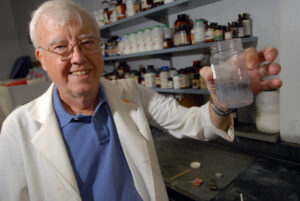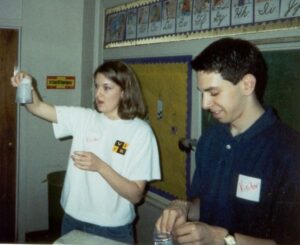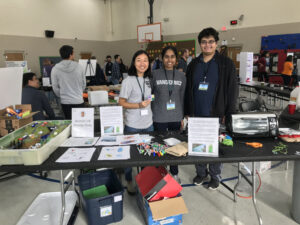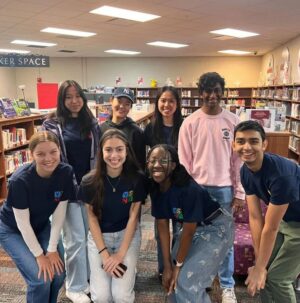Vanderbilt Student Volunteers for Science celebrates 30 years of STEM outreach
When she was in middle school, Cheryl Quartey remembers looking forward to Vanderbilt students teaching science to her class through the Vanderbilt Student Volunteers for Science (VSVS) program.
“When VSVS came to my class, I realized I had a passion for science thanks to the fun lessons taught by Vanderbilt students,” said Quartey, current VSVS co-president and double major in molecular and cellular biology and communication of science and technology (CSET). “VSVS is what drove me to become a CSET major, and I am now completing my CSET Honors thesis with VSVS.”
As a Vanderbilt freshman, she recognized the VSVS banner from years before and immediately joined the program, which gave her the unique opportunity to visit her old middle school and teach the lessons she was once taught.

Vanderbilt’s largest on-campus student organization, with approximately 320 student volunteers, VSVS was founded in 1994 by the late Professor of Chemistry Melvin Joesten and three of his students. The mission of VSVS is to teach hands-on, standards-based science lessons to middle-grade classrooms in the Metro Nashville Public School district to foster a passion for science at an age where interest declines.
“Research shows that there is significant loss of interest in science amongst middle school students, especially girls,” said David Wright, Stevenson Professor of Chemistry, director of the program in communication of science and technology, and VSVS faculty adviser. “VSVS helps these students remain interested by giving them strong role models to develop their passion for science.”
VSVS initially began with two initiatives: the VSVS Local Classroom Program and the VSVS Community Outreach Program, both of which continue today and are run by Paige Ellenberger, senior academic and educational support program coordinator.
Through the VSVS Local Classroom Program, a small team of two to five Vanderbilt students teach a science lesson in a Metro Nashville Public School classroom once per week for four consecutive weeks. The program started with 70 student volunteers serving four schools per semester and has grown to 300 to 400 volunteers serving 10 to 15 schools.
Students in the VSVS Community Outreach Program enhance STEM programming in schools by hosting STEM/STEAM nights, volunteering for science event judging, manning STEM tables at community events, and more. The Community Outreach Program hosts between five and 10 events per semester.
“Coming from an underrepresented background in STEM, it’s easy to label oneself as ‘not a science person,’” Quartey said. “With accessible programs like VSVS, students really can see themselves in our volunteers and grow to believe that they can enjoy science.”
In 2010, VSVS began teaching lessons to pediatric patients, establishing VSVS at Monroe Carell Jr. Children’s Hospital at Vanderbilt. Individual lessons are offered and taught at patients’ bedsides, with student volunteers seeing 24 to 40 children per week. VSVS also broadcasts science experiments through the Children’s Hospital’s Seacrest Studios, a multimedia broadcasting center for patients to express their creativity. Student volunteers produce three to five broadcasts per semester, which are played in patients’ rooms.

Kyle Vallone, VSVS co-president and double major in molecular and cellular biology and communication of science and technology, said through programs like these, VSVS provides every young student a chance to see the world in a way that wasn’t obvious before.
“It’s a chance to spark new interest in STEM,” Vallone said. “It’s a chance to develop visual depictions of science that will stick with a student through their education, just like how a fourth-grade demonstration of convection currents still sticks with me and challenges me to think carefully about science in daily life.”
Vallone joined VSVS because of the hands-on science demonstrations his teachers provided growing up. He felt volunteering with VSVS allowed him to “pay it forward” to a new generation of budding scientists.
“I’ve always seen service as a reciprocal relationship: you get out what you put in,” Vallone said. “Over the past four years, I’ve gotten a real inside look at public education in Nashville. Gaining exposure to new things—whether it’s thinking about science in a new way by finding out interesting facts in a lesson or experiencing a different classroom context—is at the core of VSVS.”
To extend their reach and provide learning opportunities to more students, VSVS created the VSVS Rural Outreach Program in 2012 with support from the Vanderbilt Institute of Nanoscale Science and Engineering. This program provides teachers in Davidson County, who reside outside of the five-mile volunteer radius, with hands-on science lessons that they can implement in their classrooms. VSVS provides all components of the lesson, from background material to presentations to student worksheets, and teachers can check out three kits per semester. Ellenberger provides professional development sessions for teachers each year through this program, where they can learn about the content of the kits and general science education information.
Approximately 45 teachers participate in the program, reaching around 4,000 students per year. Caren Fisher, a middle school science teacher in Shelbyville, Tennessee, is one of those teachers.
Fisher, a participant in the program since 2021, said she joined because her students needed exposure to hands-on labs, but her school district could not provide funding to support the lessons.
“I cannot emphasize how important these kits are for our rural school systems,” Fisher said. “When I see my students gain a deeper understanding of what we are learning and they are engaged, it makes me feel that I am an effective teacher. I feel that student state scores have also been impacted in a positive way due to having examples of what we are learning.”

While one main goal of VSVS is to help school children develop a passion for science, the organization also aims to help Vanderbilt students recognize the importance of community service and to stimulate an interest in teaching as a profession.
Alumnus Owen Lamson, BA’22, experienced this firsthand. Lamson started volunteering with VSVS during his sophomore year because it seemed fun, and he wanted to make an impact outside of Vanderbilt’s campus.
A double major in medicine, health, and society and political science, Lamson thought he’d pursue medical school after graduation. However, after volunteering with VSVS, he decided to join Teach for America and get a master’s degree in education.
“VSVS impacted me in a profound way. It opened the door to a career path that I never would have considered without the experience,” said Lamson, now a high school chemistry teacher in Antioch, Tennessee. “I believe what made VSVS so special is that it used the power of showing science to students through hands-on experiments, rather than telling students about science and passing out worksheets.”
Alumna Serena Pao, BA’22, held similarsentiments. A current high school leadership program coordinator in Chicago, she joined VSVS her freshman year to make a difference in students’ lives and learn more about science pedagogy.
“It was rewarding to see students intrinsically motivated to learn more about different phenomena without the pressure of exams or grades,” Pao said. “Students’ ideas and explanations surrounding each scientific process were often unique and creative, and they helped me see science in a different way, beyond the pages of a textbook.”
As VSVS celebrates 30 years and looks toward the future, Ellenberger says she sees the student organization continuing to be even more successful, because it will continue to offer meaningful opportunities for Vanderbilt students to make a difference.
“It’s been incredibly rewarding to see just how big of an impact this program has on our community and our college students,” Ellenberger said. “Vanderbilt students are not only bringing their love of science to a classroom or showing students what scientists can be like or look like, they’re developing a sense of pride and accomplishment by making a lasting difference in their community.”
This is reflected in Quartey, who said for her, VSVS remains Vanderbilt’s most direct way of connecting with and inspiring young Tennessee students, which she once was.

VSVS celebrated its 30th anniversary with an event on campus on Aug. 29, which brought together current students, alumni, faculty, staff, and community members. “Our outdoor 30th celebration event captured what VSVS means to me,” said Quartey. “VSVS is the simple joy of slime oozing through your fingers while learning something new about non-Newtonian fluids. VSVS is excited alumni in their 20th anniversary shirts returning to celebrate. After a long day of volunteering in the sun, VSVS is our 40 plus member board climbing up a two-story inflatable slide together, screaming and laughing on the way down. I’ve known VSVS since I was 11, and it hasn’t stopped giving. VSVS means a lifetime of rewarding experience.”
